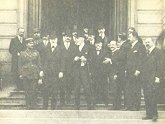| IMVROS -- THE TREATY OF LAUZANNE
The articles of the treaty that concern Imvros
Article 14
The islands Imvros and Tenedos remain under Turkish occupation.
They will have special government consisting of local elements and
there will be guarantees to the non-Muslim natives as far as the local
government organisation and the protection of people and goods are concerned. Order
will be maintained by the police, consisting of members of the native population, and be kept under
the control of the above mentioned local government.
Article 37
Turkey undertakes that the stipulations contained in Articles 38 to 44 shall be recognized as fundamental
laws, and that no law, no regulation, nor official action shall conflict or interfere with these stipulations, nor
shall any law, regulation, nor official action prevail over them.
Article 38
The Turkish Government undertakes to assure full and complete protection of life and liberty to all
inhabitants of Turkey without distinction of birth, nationality, language, race or religion.
All inhabitants of Turkey shall be entitled to free exercise, whether in public or private, of any creed,
religion or belief, the observance of which shall not be incompatible with public order and good morals.
Non-Moslem minorities will enjoy full freedom of movement and of emigration. Subject to the measures
applied, on the whole or on part of the territory, to all Turkish nationals, and which may be taken by the
Turkish Government for national defense, or for the maintenance of public order.
Article 39
Turkish nationals belonging to non-Moslem minorities will enjoy the same civil political rights as
Moslems.
All the inhabitants of Turkey, without distinction of religion, shall be equal before the law.
Differences of religion, creed or confession shall not prejudice any Turkish national in matters relating to
the enjoyment of civil or political rights, as, for instance, admission to public employment, functions and
honors, or the exercise of professions and industries.
No restrictions shall be imposed on the free use by any Turkish national of any language in private
intercourse, in commerce, religion, in the press, or in publications of any kind or at public meetings.
Notwithstanding the existence of the official language, adequate facilities shall be given to Turkish nationals
of non-Turkish speech for the oral use of their own language before the Courts.
Article 40
Turkish nationals belonging to non-Moslem minorities shall enjoy the same treatment and security in
law and in fact as other Turkish nationals. In particular, they shall have an equal right to establish,
manage and control at their own expense, any charitable, religious and social institutions, any schools
and other establishments for instruction and education, with the right to use their own language and to
exercise their own religion freely therein.
Article 41
As regards public instruction, the Turkish Government will grant in those towns and districts, where a
considerable proportion of non-Moslem nationals are resident, adequate facilities for ensuring that in the
primary schools the instruction shall be given to the children of such Turkish nationals through the medium
of their own language. This provision will not prevent the Turkish Government from making the teaching of
the Turkish language obligatory in the said schools.
In towns and districts where there is a considerable proportion of Turkish nationals belonging to
non-Moslem minorities, these minorities shall be assured an equitable share in the enjoyment and
application of the sums which may be provided out of public funds under the State, municipal or other
budgets for educational, religious, or charitable purposes.
The sums in question shall be paid to the qualified representatives of the establishments and institutions
concerned.
Article 42
The Turkish Government undertakes to take measures, as regards non-Moslem minorities, in so far as concerns
their family law or personal status, permitting the settlement of these questions in accordance
with the customs of those minorities.
These measures will be elaborated by special Commissions composed of representatives of the Turkish
Government and of representatives of each of the minorities concerned in equal number. In case of
divergence, the Turkish Government and the Council of the League of Nations will appoint in agreement an
umpire chosen from amongst European lawyers.
The Turkish Government undertakes to grant full protection to the churches, synagogues, cemeteries,
and other religious establishments of the above-mentioned minorities. All facilities and authorization will be
granted to the pious foundations, and to the religious and charitable institutions of the said minorities at
present existing in Turkey, and the Turkish Government will not refuse, for the formation of new
religious and charitable institutions, any of the necessary facilities which are granted to other private
institutions of that nature.
Article 43
Turkish nationals belonging to non-Moslem minorities shall not be compelled to perform any act which
constitutes a violation of their faith or religious observances, and shall not be placed under any disability by
reason of their refusal to attend Courts of Law or to perform any legal business on their weekly day of rest.
This provision, however, shall not exempt such Turkish nationals from such obligations as shall be imposed
upon all other Turkish nationals for the preservation of public order.
Article 44
In so far as the preceding Articles of this Section affect non-Moslem nationals of Turkey,
these provisions constitute obligations of international concern and shall be placed under the guarantee of
the League of Nations. They shall not be modified without the assent of the majority of the Council of the
League of Nations. The British Empire, France, Italy and Japan hereby agree not to withhold their assent to
any modification in these Articles which is in due form assented to by a majority of the Council of the
League of Nations.
Turkey agrees that any Member of the Council of the League of Nations shall have the right to bring to the
attention of the Council any infraction or danger of infraction of any of these obligations, and that the
Council thereupon take such action and give such directions as it may deem proper and effective in the
circumstances.
Turkey further agrees that any difference of opinion as to questions of law or of fact arising out of these
Articles between the Turkish Government and any one of the other Signatory Powers or any other Power,
a member of the Council of the League of Nations, shall be held to be a dispute of an international
character under Article 14 of the Government of the League of Nations, The Turkish Government hereby
consents that any such dispute shall, if the other party thereto demands, be referred to the Permanent
Court of International Justice. The decision of the Permanent Court shall be final and shall have the same
force and effect as an award under Article 19 of the Covenant.
by Dimitris and Vasilis Karavasilis
Copyright: Hellenic Electronic Center
|






|











